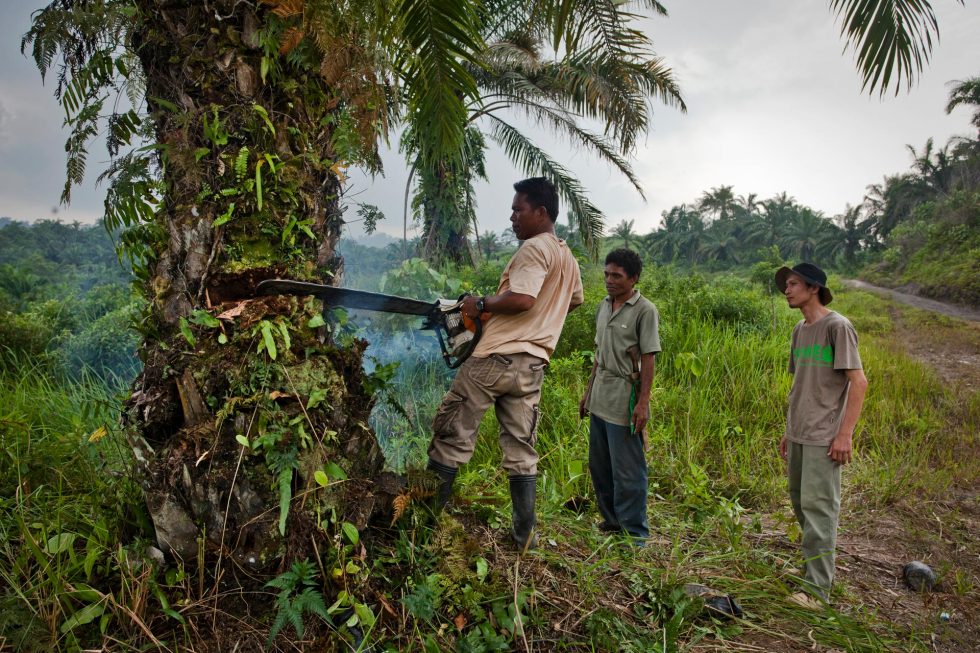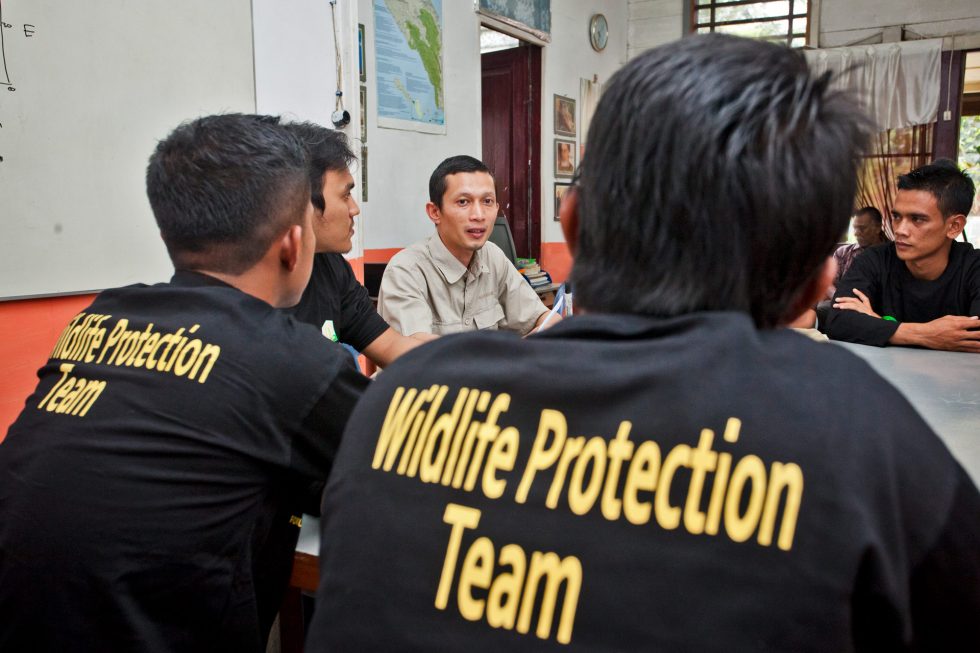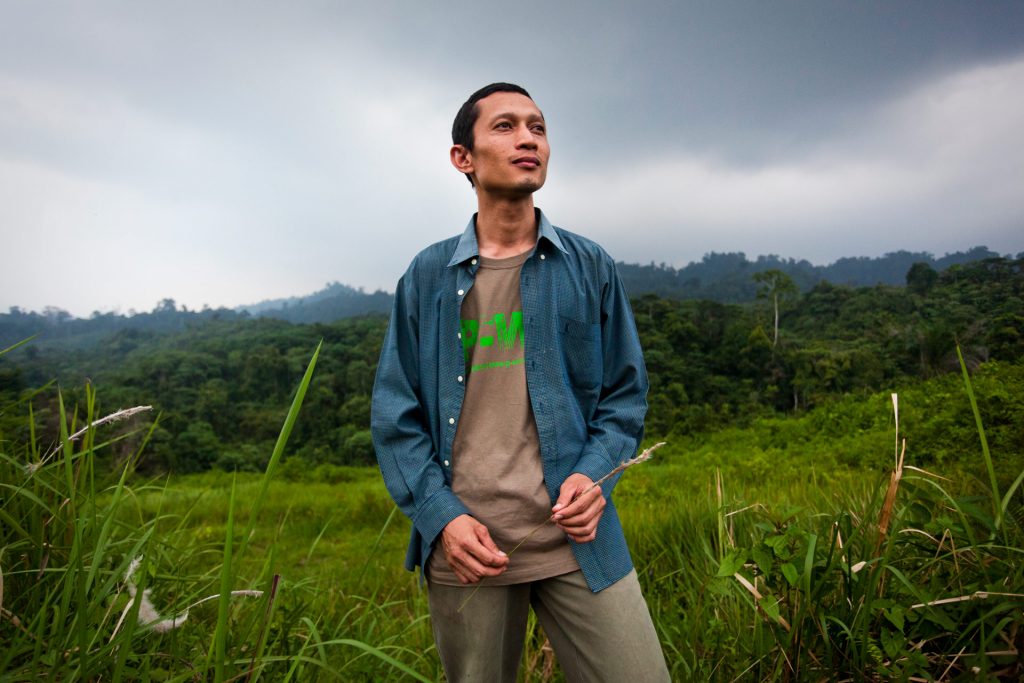Indonesian activist Rudi Putra received the 2014 Goldman Prize for his activities in Sumatra. A biologist by training, Rudi Putra led communities in dismantling illegal palm oil plantations that are causing massive deforestation in northern Sumatra’s Leuser Ecosystem, protecting the habitat of the critically endangered Sumatran rhino. We have asked him about his experiences, and views on forest conservation and social engagement in ecosystems’ protection and restoration.
How did you start engaging with forest conservation and activism?
«I was born and grew up in Aceh, one of the regions that has a vast and dense forest area. In the 1980s, as a kid I used to enjoy the clear river where we swam regularly, spending time fishing and even sometimes enjoying the flood that naturally came during the rainy season. Indeed, when floods hit our neighbourhood, my adventurous soul joyously ecstatic and excited, as it calls me to play and swim along with my friends. Until one day, an oil palm company irresponsibly polluted the river with its waste, killing so many freshwater life, spreading skin diseases and of course snatching away those precious moments.
These experiences lead me to learn Biology in university in order to gain a deeper and wider understanding about the environment. While in university I was very lucky to have an opportunity to join a European Union program to visit the Leuser Ecosystem and meet Professor Carel van Schaik, one of the orangutan experts who then funded my research in Suaq Belimbing Research Station. Since then and even until now, I am still hooked by the beauty of the ecosystem. This is one of the main reasons why I devote myself in protecting and conserving the irreplaceable Leuser Ecosystem».
You want to read more indigenous, underreported stories?
Subscribe to our newsletter (in Italian).
How did people around you reacted and react today to your activism, and ow did the local government react?
«Here in Aceh, local communities respect environmental activists. Some people believe that being an activist is just a hobby – like trekking, hiking in the mountains, or even wandering around in some areas. But for those who understand the entirety of our activities, surely know how risky and challenging this job is. Some of my friends have warned me to be cautious, and some have asked me to stop, especially when the news about the arrest or injury of environmental activists became a trending topic for quite some time.
Initially, the government was very anti-activist. When I fought against illegal oil palm plantations, surprisingly, one of the most reacting parties came from the government, not from the company itself. Although we can expect this reaction might be due to company complaints and lobbying».
Is your activity dangerous for you and who else is involved?
«10 – 20 years ago, environmental activists faced a lot of threats and intimidation from illegal actors such as loggers, poachers, and encroachers. Certainly, it is one of the risks when we eradicate their sources of income. But currently, the risk is much lower than a few years ago.
Over the years we have been re-arranging our strategy, whereby we are more focused in encouraging improvements in government governance of forest resources and assisting plantation entrepreneurs for sustainability practices as well as increasing the protection of the ecosystem. In addition, we also strengthen the community to manage their forest natural resources which can also benefit their economy and the environment».

Rudi Putra (right) supervises a forest restoration team cutting down a palm oil tree in the Leuser Ecosystem, Indonesia. This 6.4-million acre, federally protected forest spanning the Aceh and North Sumatra provinces is one of the few remaining homes for the Sumatran rhino. Photo: Goldman Environmental Prize.
Is your activity dangerous for you and who else is involved?
«Many people are helping me in conserving the ecosystem. These strong fellows are not only from my team, but I also received a lot of support from the government, military, entrepreneurs, and the community itself. We have seen the community actively protecting their forest from illegal activities, companies improving their sustainable practices, and the government increasing their efforts in environmental protection».
Can you describe what an oil palm plantation looks like? And what the Leuser forest looks like?
«Oil palm is not a bad crop. This crop is indispensable to meet the world’s demand for vegetable oil with a much higher productivity than other types of vegetable oil. However, due to high demand, oil palm companies are undertaking unsustainable expansion, shifting high diversity of forest areas into monoculture plantations that reach thousands of hectares.
One of the forest areas that faces the oil palm or other commodities expansion is Leuser Ecosystem, which is one of the largest remaining forested landscapes on earth with a very high biodiversity. With an area comprising 2.6 million hectares, Leuser Ecosystem is the last place on earth where all four megafaunas, namely Sumatran tigers, elephants, rhinos and orangutans still co-exist in one landscape. Leuser is home to 105 species of mammals, 382 species of birds, and at least 95 species of reptiles and amphibians (54% of Sumatra’s terrestrial fauna).
But most importantly for us, Leuser is a source of life that serves enormous ecological services, such as producing 200,000 billion cubic meters of water every year to support 4 million people, preventing ecological disasters such as floods and landslides, as well as holding 2,700 gigatonnes of carbon, which majorly contribute in climate change prevention and mitigation».

Rudi Putra briefs the wildlife protection team at Forum Konservasi Leuser/Leuser Conservation Forum (FKL). Photo: Goldman Environmental Prize.
Do you think that today Acehnese people are more aware of their forests than before?
«Currently, the community is much more aware. In the past few years, the number of floods and droughts has increased in all regions of Aceh Province. People are starting to realize that forest protection is an important effort to protect people’s welfare from ecological disasters. Thousands of hectares of forest are currently being restored by local communities. Although encroachment is still there, the total area has decreased considerably compared to 2017.
Some of the efforts we can also see are the increase in community MSMEs in producing Non-Timber Forest Products (NTFPs) such as forest honey. Honey is now a commodity that has a great interest for people both inside and outside of Aceh. In order to sustain honey production, of course forest protection must be done in the first place».
Do you think the situation of forests in your country (and in the world) is going towards improvements and solutions or it is worsening?
«Indeed, the deforestation rate in some countries is decreasing, as well as in Indonesia. Some countries are also quite aggressive in restoring their forests, increasing the use of renewable energy, and the demand for sustainable goods which then sooner or later becomes mandatory.
I am quite optimistic that in the future forest loss will lead to the opposite direction that there will be increasing forest cover. Even though these efforts are a little too late to restore biodiversity plus the ever-increasing climate change, I believe that nothing is in vain. The earth will be green again».
What kind of support would you ask to European citizens?
«Europe is a huge market to accommodate products from countries that have natural and forest resources such as Indonesia. The high awareness to use sustainable products will certainly help us in protecting the forest.
Forest conservation is also not a cheap cost. Of course, the support of many people from various countries is needed to ensure that conservation activities will continue in the future».


